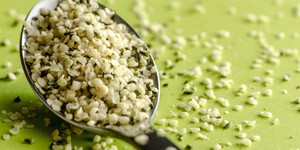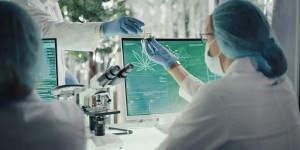By Lisette Wijnkoop

Lisette Wijnkoop was educated as a pharmacist and have been working a lot in the field of natural medicines like homeopathy. In 2006 she started with cannabis as medicine in a specialised cannabis pharmacy in Groningen in The Netherlands. This project ended after one year and she started to work at Bedrocan, both as a quality controller of the processing of cannabis and as an adviser for patients, doctors and others in the medical field. At this moment Lisette is adviser for the medicinal cannabis division of Information Center Cannabis, an independant organisation. With Arno Hazekamp and others they are starting a foundation to organise courses for medical doctors and give information to other groups interested in medicinal use of cannabis.
Cannabis is becoming more and more popular for its therapeutic properties. Scientific studies as well as experiences of patients show therapeutic effects on many different types of illnesses and complaints, such as chronic pain, epilepsy, multiple sclerosis and rheumatism. A wide range of products are available, sometimes made at home or distributed via web shops. Questions arise like: what is legal? And what are the rules and regulations for products on the market for health products? This article will present a short overview. The first section outlines the regulations that apply to health products; what are the do’ s and don’ts when preparing and selling herbal products in general. The second part describes the special rules for cannabis and hemp.
As CBD-containing products and medicinal cannabis are relatively new in most countries, the regulations are not yet very fixed and specified. In general, a lot of regulations for foods and medicines are unified for the EU. However, for hemp and cannabis most regulations are still made on a national level. In that case the information about the Dutch situation will be used as an example in this review. Please be aware that for other countries different rules may apply.
Medicine or health product
First, it is important to clarify the difference between an herbal medicine and an herbal health product. A product has to follow the regulations for medicines when it is ‘presented for treating or preventing disease in human beings.’(1). So, as soon as a product claims to have a medicinal effect it is legally considered a medicine. The consequence is that to market such a product, it has to meet all kinds of regulations: for example, the medical claim must be scientifically proven, the production process must be controlled following strictly defined procedures, the source of ingredients must be controlled, and the product must be registered by the EU or national authorities. An example of a cannabis-based medicine is the product Sativex®. It is an herbal cannabis medicine, in the form of an extract that must be sprayed under the tongue. It has been registered in several countries for the use by patients with multiple sclerosis and is only available on prescription by a medical doctor through a pharmacy.
Preparations made of herbs that are not registered as a medicine can be called herbal health products or dietary supplements. However, they can not be claimed to have a medicinal effect. Only general health claims are allowed in advertising and labelling. That can be for example: for a better health, to feel better, to improve your skin, etc. (2). For a lot of health products clear descriptions for the effect are laid down in rules. This is for example the case for vitamins and minerals.
A product can also become medicine by dosage or effect. CBD for example can be used as a health product, but it also has medicinal properties. Some patients with epilepsy can have benefit from the use of highly concentrated CBD-oil. Even if this effect is not claimed, it has the potency for therapeutic effect and therefore can be seen as a medicine. This can be a reason for national authorities to ask a product to be registered. This regulation is not mentioned as such in the European directive on medicinal products. But there has been a court case, the so-called Hecht Pharma Arrest in which a health product was seen by the court as medicine (3). But in another case a similar claim by the national health authorities was acquitted by the court. That was in the Netherlands with melatonin (4). In the Netherlands health authorities claim that CBD may only be sold as health product if the daily dose is not higher than 160 mg per day (5). At higher dosages, CBD can have medicinal effect.
Regulations for health products
For herbal health products, regulations are less strict than for herbal medicines, but they do have to meet the requirements for dietary supplements and food. The general European regulations do not have special conditions for herbal products. Some national regulations do have some, for example in the Netherlands: certain herbs may not be used because they are considered too toxic. Others can be used only in certain concentrations, for example in case they contain constituents that may be harmful in high quantities.
There are currently no rules for the quality of the raw materials for herbal products, nor for the production techniques or quality control of the final product. Preparations for personal use may be made under your own rules and responsibility. But as soon as the products are sold on the market and on a more industrial scale, the rules become stricter. For example, the authorities must be informed about every food business operator that carries out production, processing or distribution of food(supplements). Every establishment active in this field must be registered.
Safety
The most important requirement for the preparation of (herbal) health products is that they must be safe (6). In general, products may be put on the market without a registration. In national regulations a country can ask a manufacturer to first show a label of the product to the authorities before it can be sold on the market. Some countries don’t even ask this. In this way lots of products can be sold, without being controlled by the authorities. So in case there is a problem, the manufacturer is responsible because he only may produce safe products. This safety can be guaranteed by good hygiene and HACCP certification as these are mandatory for foodstuff, and food supplements are included (7).
HACCP stands for ‘Hazard Analyses and Critical Control Points’. The manufacturer is responsible for a good quality of the product and to prevent hazards. He has to make inventory of all critical points during the production, processing, packaging and so on. For example he has to buy good quality raw material from trustworthy suppliers. To do so there must be ways to control the quality of the material and the supplier. Describing these controls, and practice it during production of the products, is all part of HACCP. The preparation environment has to be clean, so there are no possibilities for contamination with unwanted products (e.g. cleaning products, dust, hair, insects) or with microbes. In the case of CBD extracts, questions to be asked include: what is the purity of the extraction solvent used? How can I be sure there are no residues in the final product? And the employees have to be instructed to work according the described HACCP rules. Also the employees themselves have to work in safe conditions (for example, not in a room full of alcohol-vapor!).
Therefore: see how the working environment can be controlled, what checks and controls are performed, and what ingredients are used. Write this down in clear procedures. These are called Standard Operating Procedures, or SOPs. For each batch produced, a report form is made where the controls are registered. At the end of each step, the person in charge signs off for performing the required step.
Although the regulations allow for some flexibility towards small companies, the intention of each manufacturer, large and small, must be to prepare the products as clean and safe as possible. If they decide to inspect you, the authorities can ask for the protocols you worked with. There are standard HACCP handbooks that can be followed. However, whatever you choose, authorities want to know which procedure (handbook) is followed.
Labelling
The label of food (and health) products must contain a lot of information, all described in EU regulations: a detailed list of ingredients, including the quantity, the total content, expiry date, stocking conditions and how to use the product. Furthermore, information about the manufacturer or packaging company must be present as well as the place of origin. You also need to include batch number and in relevant situations an alcohol percentage (8).
Additional information in case of health claims is necessary on the label or in advertising, such as a statement indicating the importance of a varied and balanced diet and a healthy lifestyle and the quantity of the food and pattern of consumption required to obtain the claimed beneficial effect (9).
Special Cannabis regulations
In 1961, the United Nations introduced the Single Convention on Narcotic drugs. In this document Cannabis was described as a ‘dangerous narcotic with high potential for abuse and no accepted medicinal value’. This document was the basis for the worldwide War on Drugs that continues until today. National laws adopted this regulation and every country can have different rules. However, in most countries, cannabis became illegal to grow, use or sell, with severe punishments.
The Dutch Opium Act states that it is officially forbidden to sell, use and process any kind of cannabis. It makes no difference if it contains THC or not. But there are some exceptions: it is authorized for medicinal use if prescribed by a medical doctor, sold in pharmacies and grown by specific growers that have an official permission (for example: Bedrocan in the Netherlands). Also researchers, scientists, and pharmaceutical companies need a license to work with cannabis.
For the cultivation of industrial hemp the Dutch Opium Act regulations say that this cultivation is authorised for production of fiber and seed(multiplication) (10). It should be noted that this is authorised on EU level only with certain hemp varieties that contain less than 0,2% THC (in the dried flowers) (11).
Hemp plants must be grown outdoors in the field and the farmer must be registered. A specified number of plants must be set apart and should not be harvested. They will be checked at a specific moment of flowering of the hemp, to ensure there is no significant amount of THC present.
New national rules have to be made to deal with CBD-products as these are not yet described in actual official law. In the Netherlands the following rules are currently applied by the authorities: industrial hemp may only be grown for the production of seeds and fiber. However, growing hemp with the purpose of extracting the leaves or flowers, with the intention to make CBD oil, is NOT allowed. CBD-oil has to contain not more than 0,05% THC .That means that imported CBD oil may be used in the Netherlands, but it is not possible to produce it locally (5). It has to be said that these regulations are not yet fixed and officialised.
Products that fall under the Opium Act, including CBD oil, may not be promoted or advertised. Even a health claim is not tolerated for CBD-oil in the Netherlands. Because the sales of THC is not allowed in the Netherlands, except on prescription by pharmacies (even though it is tolerated in herbal form in coffeeshops) it is not possible to produce, sell or advertise THC- containing cannabis oil.
Conclusion
The recent developments with hemp and CBD as health products have created a lot of unclear situations. Everywhere, authorities are looking for appropriate regulations to deal with this new situation. In the meantime manufacturers try to put products on the market. They have to meet the general food and health product regulations and any local additional hemp or cannabis rules that are not always available yet. A lot needs to be clarified before cannabis-based health products can claim a stable market within the EU.
Table: summary of regulations for herbal products and CBD-products
| Herbal product | Regulation | CBD-product | Regulation |
|---|---|---|---|
| No medical claims allowed | EU | No medical nor health claims allowed | NL |
| Limited dosage (in case of specific plants) | EU/NL court | Max. 160 mg CBD allowed per day | NL* |
| Product must be safe to use | EU | THC level must be < 0,05% | NL* |
| Hygiene / HACCP rules must be applied | EU | No processing of leaves and flowers allowed | NL* |
| Correct label must be displayed on the product | EU | No THC displayed on the label | NL |
*) Practical regulations of the Health authorities, not (yet) laid down in official regulations.
Literature used
- DIRECTIVE 2001/83/EC OF THE EUROPEAN PARLIAMENT AND OF THE COUNCIL of 6 November 2001 on the Community code relating to medicinal products for human use
- REGULATION (EC) No 1924/2006 OF THE EUROPEAN PARLIAMENT AND OF THE COUNCIL of 20 December 2006 on nutrition and health claims made on foods
- Arrest van het Hof (Eerste kamer) van 15 januari 2009.
Hecht-Pharma GmbH tegen Staatliches Gewerbeaufsichtsamt Lüneburg: http://curia.europa.eu/juris/celex.jsf?celex=62007CJ0140&lang1=nl&lang2=EN&type=TXT&ancre= - http://deeplink.rechtspraak.nl/uitspraak?id=ECLI:NL:RBDHA:2016:6019
- Personal information of the health authorities in The Netherlands
- The General Food Law: REGULATION (EC) No 178/2002 OF THE EUROPEAN PARLIAMENT AND OF THE COUNCIL of 28 January2002 laying down the general principles and requirements of food law, establishing the European Food Safety Authority and laying down procedures in matters of food safety
- REGULATION (EC) No 852/2004 OF THE EUROPEAN PARLIAMENT AND OF THE COUNCIL of 29 April 2004 on the hygiene of foodstuffs
- DIRECTIVE 2000/13/EC OF THE EUROPEAN PARLIAMENT AND OF THE COUNCIL of 20 March 2000 on the approximation of the laws of the Member States relating to the labelling, presentation and advertising of foodstuffs
- REGULATION (EU) No 1169/2011 OF THE EUROPEAN PARLIAMENT AND OF THE COUNCIL of 25 October 2011 on the provision of food information to consumers
- Opiumwetbesluit http://wetten.overheid.nl/BWBR0014405/2013-01-08
- Council Regulation (EC) No 1673/2000 of 17 July 2000 on the common organisation of the markets in flax and hemp grown for fibre.


